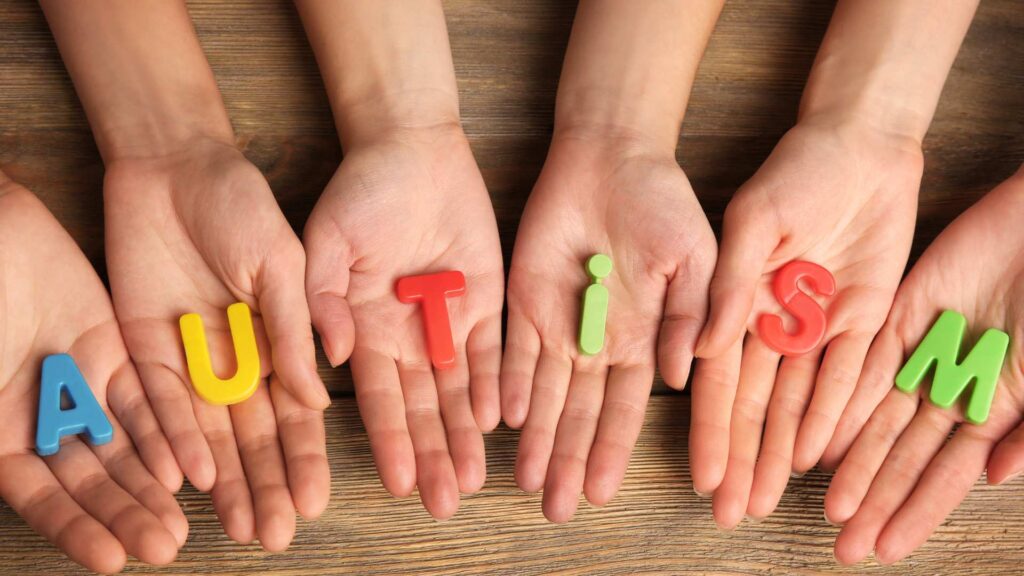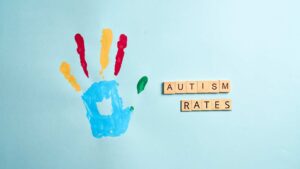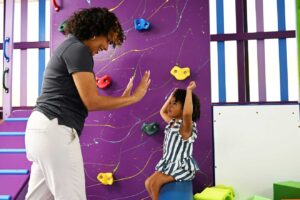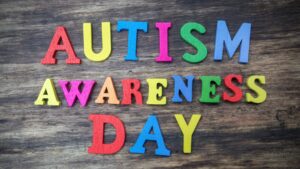Tabla de contenidos
¿A las personas con autismo les va bien en la universidad?
Anteriormente hemos hablado de los retos a los que se enfrentan las personas con trastorno del espectro autista (TEA) a lo largo de su vida. Cada etapa viene con su conjunto de obstáculos únicos, y uno de los más significativos para los adultos jóvenes con autismo en la universidad es navegar por la vida social, el rendimiento académico y las expectativas. Para muchos adultos jóvenes con autismo, las luchas cotidianas pueden incluir:- Navegar por situaciones sociales
- Interpretar las señales no verbales
- Manejar las sensibilidades sensoriales
- Adaptarse a los entornos no estructurados
Conceptos Erróneos Comunes Sobre las Personas con Autismo en la Universidad
 Uno de los desafíos que enfrentan los adultos jóvenes con autismo en la universidad es la prevalencia de conceptos erróneos en torno a su condición. Muchos todavía tienen una visión limitada del autismo, creyendo que todos los individuos en el espectro son iguales o que la condición solo involucra discapacidades intelectuales. En verdad, el autismo es completamente individualizado. Algunos estudiantes pueden tener dificultades con la sobrecarga sensorial en entornos agitados, mientras que otros pueden tener dificultades para leer las señales sociales o adaptarse a entornos no estructurados como los proyectos grupales.
Estos conceptos erróneos pueden llevar a malentendidos con profesores y compañeros, quienes pueden esperar ciertos comportamientos o respuestas que no se alinean con la forma en que una persona con autismo experimenta el mundo. Esta interpretación errónea crea una presión adicional para que los adultos jóvenes con autismo expliquen constantemente sus necesidades o incluso enmascaren sus dificultades, lo que lleva al agotamiento emocional y sentimientos de aislamiento
Uno de los desafíos que enfrentan los adultos jóvenes con autismo en la universidad es la prevalencia de conceptos erróneos en torno a su condición. Muchos todavía tienen una visión limitada del autismo, creyendo que todos los individuos en el espectro son iguales o que la condición solo involucra discapacidades intelectuales. En verdad, el autismo es completamente individualizado. Algunos estudiantes pueden tener dificultades con la sobrecarga sensorial en entornos agitados, mientras que otros pueden tener dificultades para leer las señales sociales o adaptarse a entornos no estructurados como los proyectos grupales.
Estos conceptos erróneos pueden llevar a malentendidos con profesores y compañeros, quienes pueden esperar ciertos comportamientos o respuestas que no se alinean con la forma en que una persona con autismo experimenta el mundo. Esta interpretación errónea crea una presión adicional para que los adultos jóvenes con autismo expliquen constantemente sus necesidades o incluso enmascaren sus dificultades, lo que lleva al agotamiento emocional y sentimientos de aislamiento
Explorando los Desafíos Académicos y Sociales
Para los adultos jóvenes con autismo en la universidad, los desafíos académicos a menudo van más allá de la dificultad del trabajo del curso. Aunque algunos pueden sobresalir en materias específicas, pueden necesitar ayuda con habilidades del funcionamiento ejecutivo, como gestión del tiempo, organización de tareas y adaptación a nuevos estilos de enseñanza.
El estudio ”University Students with Autism: The Social and Academic Experience of University in the UK" exploró las experiencias sociales y académicas de los estudiantes universitarios con y sin autismo en el Reino Unido. Encontró que los estudiantes autistas enfrentaban desafíos más significativos en ambas áreas en comparación con los estudiantes no autistas, especialmente en las interacciones sociales y la adaptación académica. Los estudiantes con autismo a menudo tenían dificultades con las habilidades sociales, lo que los llevaba a la soledad y el aislamiento, y reportaron niveles más altos de problemas de salud mental.
Si bien disfrutaban de sus estudios académicos, muchos tenían dificultades para adaptarse a la vida universitaria y a la gestión de tareas. El estudio también destacó la importancia del apoyo personalizado, señalando que algunos estudiantes con TEA no recibieron la ayuda que necesitaban, especialmente en comunicación social.
Navegando por la Independencia
Una de las transiciones más significativas que los adultos jóvenes con autismo también enfrentan en la universidad es el cambio hacia una mayor independencia.. En la escuela secundaria, muchos estudiantes cuentan con el apoyo de maestros, padres o asistentes que los ayudan a superar los desafíos diarios. Sin embargo, en la universidad, estos sistemas de apoyo pueden no estar disponibles de manera tan inmediata, y los estudiantes tienen que administrar su propio tiempo, responsabilidades y cuidado personal.
Para muchos estudiantes en el espectro, esta nueva independencia puede ser tanto liberadora como intimidante. Sin el apoyo o la orientación constantes familiares, deben aprender a equilibrar las demandas académicas con las expectativas sociales y las necesidades personales.
El estudio “Supporting Independence in Adolescents on the Autism Spectrum" muestra que muchos adolescentes con TEA luchan con la autosuficiencia, a menudo obteniendo puntuaciones mucho más bajas en las medidas de comportamiento independiente en comparación con sus compañeros. Es posible que vivan más tiempo en casa y tengan dificultades para encontrar trabajo o seguir estudiando. Además, las personas con TEA a menudo dependen en gran medida del apoyo de los demás debido a problemas con el funcionamiento ejecutivo, como la planificación y la flexibilidad, y pueden exhibir comportamientos que dificultan su independencia.
Si bien esto puede conducir a un período de ajuste, también puede ser una oportunidad para el crecimiento. Los estudiantes con autismo pueden desarrollar resiliencia y habilidades para resolver problemas al aprender a lidiar con los desafíos de la vida independiente.
Estrategias para el Éxito en la Universidad

A pesar de estos desafíos, muchas estrategias pueden ayudar a los adultos jóvenes con autismo a prosperar en la universidad, tanto académica como socialmente. Aquí algunos enfoques críticos:
1. Utilizar los Servicios de Apoyo del Campus: La mayoría de las universidades ofrecen servicios para discapacitados que pueden proporcionar adaptaciones como horarios extendidos para los exámenes, asistencia para tomar notas o espacios tranquilos para estudiar. Los estudiantes con autismo deben ser proactivos en la búsqueda de estos recursos y abogar por sus necesidades.
2. Establecer una Rutina: Desarrollar una rutina diaria puede aportar una estructura muy necesaria al caos de la vida universitaria. Esta estructura puede incluir el establecimiento de horarios específicos para el estudio, las comidas, el ejercicio y la relajación. Muchos estudiantes en el espectro encuentran consuelo en la previsibilidad, por lo que crear un horario personal puede ayudarlos a mantenerse organizados y reducir el estrés.
3. Construir una Red de Apoyo: Los adultos jóvenes con autismo deben identificar a las personas que los apoyen en el campus, ya sea un profesor de confianza, un asesor académico o compañeros que entiendan sus necesidades únicas. Unirse a clubes o grupos de apoyo diseñados para estudiantes en el espectro también puede proporcionar un sentido de pertenencia y reducir los sentimientos de aislamiento.
4. Practicar la Autodefensa: La universidad a menudo requiere más independencia, lo que significa que los estudiantes con autismo deberán aprender a abogar por sí mismos. Pueden hablar sobre sus necesidades en el aula o informar a sus compañeros de cuarto sobre sus preferencias con respecto al ruido, el espacio o la interacción social.
Navegando el Espectro con ABA Centers of Florida
En ABA Centers of Florida, hemos guiado a cientos de clientes a través de su viaje por la neurodivergencia, desde el diagnóstico y la intervención temprana hasta el desarrollo de programas ABA personalizados en Doral, Miramar, Jensen Beach, Tampa, Orlando, Boca Ratón, Melbourne, Davenport, Kissimmee y Bradenton.
Nuestros programas personalizados se enfocan en mejorar las fortalezas de cada individuo mientras abordamos los comportamientos desafiantes; las lecciones de terapia ABA fomentan una mayor independencia y los preparan para objetivos como la transición a la universidad. Al enfocarnos en comportamientos desafiantes y desarrollar habilidades esenciales para la vida, nuestro objetivo es equipar a las personas con las herramientas que necesitan para navegar sus sensibilidades y necesidades específicas de manera más efectiva.
Estamos aquí para guiar a tu hijo hacia la independencia, ayudándolo a desbloquear su potencial y navegar mejor por el mundo que lo rodea. Llámanos al (772) 773-1975 o programa una consulta gratuita para obtener más información sobre cómo podemos apoyar el crecimiento y el éxito en el futuro de tu hijo.








